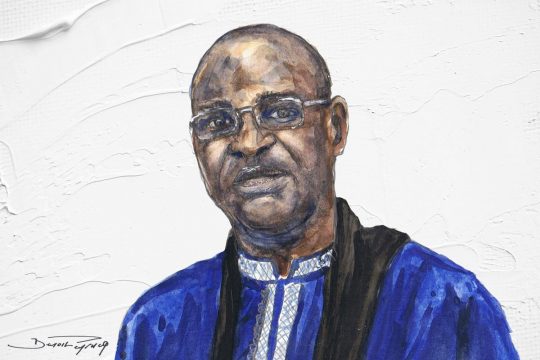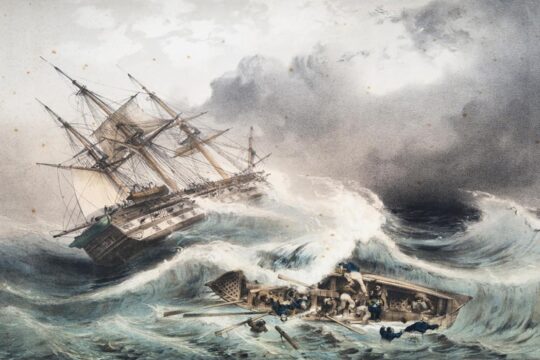Germany’s bid to make amends for its 1904-1908 genocide against the Herero and Nama people has been rejected by Namibian victims, while Belgium’s parliamentary commission on its colonial crimes in Africa failed to agree on an apology. Meanwhile, France’s much-heralded return of African cultural objects, seen as a possible precedent, is so far going at a snail’s pace.
Carsten Stahn, professor of International Criminal Law at the University of Leiden in the Netherlands, says attitudes to the return of cultural objects have changed in Europe, which is a sign of hope, but progress is patchy. British journalist Barnaby Phillips, who wrote the book “Loot” on Britain and the Benin Bronzes, thinks that momentum on return of cultural objects has not necessarily slowed down.
“The Benin Bronzes are rather emblematic of this debate,” he told Justice Info. “There's been extraordinary momentum over the last 18 months or so with announcements from Germany, from various museums here in the UK, the Smithsonian in Washington -- and indeed, with further announcements expected this year. So in that regard, I think we're in a place that nobody imagined we would be even three years ago, let alone five or ten.” Germany has begun the process of returning them, while the Smithsonian has already transferred ownership of 29.
On reparations for victims, there have been some moves from European states, but they are decidedly wary. As Stahn says in a 2020 editorial for Leiden University law school, “many states or actors recognize moral responsibility or political forms of redress as part of a reparative approach towards wrongdoing (apology, forgiveness, contrition, atonement, and reconciliation), but shy away from approaches which would imply any legal recognition of wrong, in order to avoid precedents.”
Reparations: fear of opening a “Pandora’s Box”
The Germany and Namibia case is a good example of this. German political scientist Henning Melber says Germany made “a significant step in the right direction” with regard to addressing its colonial crimes against the Herero and Nama people of Namibia – seen by many historians as the first genocide of the 20th century -- , but then it came to a halt. “So actually they started something which was very much welcome, and then they were in fear of creating a far-reaching precedent,” he told Justice Info.
Between 1904 and 1908, following an “Extermination Order” issued by General Lothar von Trotta, German forces wiped out some 80% of Namibia’s Herero people, who had risen up against German rule, and up to 50% of the Nama. Members of these groups were killed, driven into the desert to die of thirst and starvation, put in concentration camps and their remains taken to Germany for “experiments” of a racial nature, in what is seen by some as a precursor to the Holocaust. Their land was also taken and is still occupied mostly by the descendants of German settlers.
In late 2015, Germany embarked on negotiations with the Namibian government. In May 2021, Germany and Namibia signed an agreement including Germany’s payment of 1.1 billion euros over 30 years for development projects. But this has been rejected by victims’ descendants, who say it is not enough and they were excluded from the talks. It has also been rejected by the Namibian parliament. The process is now stalled.
Melber thinks Germany got cold feet and realized it was opening a “Pandora’s Box” that could bring claims from other communities, for example in former German East Africa, or Poland, Italy and Greece in relation to the Second World War. “I think when they got into it, they realized just what they had got into, and then maybe there was also pressure behind closed doors from the European Union or other former colonial powers,” he told Justice Info.
Melber is convinced some other former colonial powers applied pressure on Germany. Britain, for example, which was the largest colonial power, committed a litany of crimes across the globe. After a court battle, the UK authorities did agree in 2013 to pay reparations to 5,000 victims of a bloody crackdown on the 1950s Mau Mau rebellion against colonial rule in Kenya. But, as Melber says, it was “very careful to avoid legal precedents”, and a later legal claim, raising the cases of a further 40,000 Kenyans who asserted they had been tortured, mistreated and raped during the suppression of the rebellion failed.
What’s in an apology?
Stahn of Leiden University thinks Germany, the Netherlands and Belgium are the European countries that have done the most so far on addressing colonial crimes.
Belgium, for example, set up a parliamentary commission to look into its colonial crimes in DR Congo, Rwanda and Burundi. This commission was a potential pioneer in Europe, but at the end of December, after two and a half years of looking into the past, there was no political consensus to apologize to the victims, which also put paid to all its other recommendations, at least for now. Centre-right parties preferred to stick to the “regrets” expressed by the Belgian king in the DR Congo, rather than make a fuller apology which could carry a risk of having to pay huge financial reparations.
Some German ministers have said that what their country did in Namibia “would now be called genocide”, but there has been no straight recognition of genocide from the top, as demanded by Namibian victims. Genocide was not recognized in international law until 1948, with the adoption of the Genocide Convention. However, the German parliament and some other countries including the US have recognized the 1915 Turkish atrocities against Armenians as a genocide – provoking outrage from Turkey.
Last year, French president Macron announced the creation of “mixed commissions of historians” to shed light on France’s colonial past in Cameroon and Algeria. The Cameroon commission, which is already subject to criticism, was launched in March 2023 and is due to complete its work by the end of 2024. The Algeria commission was even more controversial. It remains to be seen what they will produce.
Restitution roadblocks
Many European museums have become more sensitive to researching the origins of their collections, involving concerned communities in this process, and returning objects stolen during the colonial era. But museums have varying degrees of autonomy and political will, as Phillips points out.
The Benin Bronzes, again, are a good example. Looted by a British punitive expedition in 1897 from the Palace of the Oba of Benin, Nigeria, these exceptional works of art are now scattered in museums across Europe. But while there have been some restitutions – for example, Germany has returned 21, with more restitutions and ownership transfers promised by Germany and others --, the largest collection of Benin Bronzes (944) – classed as a “national collection” -- remains in the British Museum in London.
“The British Museum operates under something called the British Museum Act of 1963,” says Phillips. “Essentially it is almost impossible, or at least very difficult for the British Museum to permanently return objects in its collection unless or until that act changes.” In the past, he thinks, “the British Museum trustees and directors have hidden behind the law” as a “convenient excuse” not to act on restitution demands notably from Nigeria and Ghana. Now there may be more political will, but their hands are tied unless there is a change in the law. This is unlikely under the current Conservative government, he thinks.
“More should be done at European level”
“I want within five years that the conditions be met for temporary or permanent restitutions of African cultural heritage to Africa,” French President Emmanuel Macron said in Ouagadougou, Burkina Faso, in 2017. He also commissioned a report on the restitution of African cultural heritage (the Sarr-Savoy report), which recommended the full restitution of all objects taken by force or presumed to have been acquired through inequitable conditions.
France returned a symbolic sword to Senegal in 2019 and 26 objects to Benin in 2021, but this represents only a fraction of what is held in French museums. The largest collection of African art is held in the Musée du quai Branly in Paris, from which the Benin objects were returned. But since then, no other restitutions have followed, although that museum has received official requests from Madagascar, Côte d’Ivoire, Ethiopia, Mali and Chad, according to its website. Asked about this, the museum’s deputy communications director Lucie Casassus noted that “the decision to transfer ownership of the works can only be made by the government, and not the museum”.
In France all public assets, including the contents of publicly owned collections such as museums are regarded as inalienable possessions (i.e. ownership cannot be transferred). The restitutions to Benin and Senegal required a decision by parliament, and took much discussion. Parliament’s approval in 2020 applied only to those specific cases.
Stahn notes that only Belgium has adopted a “framework” legislation on return of ill-gotten cultural artefacts, allowing restitutions to go faster, and thinks that France should do the same. “More should be done at the European level,” he told Justice Info.
Impetus in “New World” countries
While progress in Europe is patchy, both Melber and Stahn think there is more impetus in so-called “New World” countries to address the legacy of settler crimes against First Nations. They point particularly to New Zealand, which Melber says has set an example, especially under former Prime Minister Jacinda Ardern with moves to apologize, compensate and even change the history books. Maori law has been recognized and now “lives together” with a body of law inherited from the British. Canada, too, has come quite a long way on apologies and compensation particularly for the terrible legacy of its indigenous residential schools.
“I think it's a given that there is more impetus, even if it took very long,” says Melber. “But these are former settler colonial societies. That means the victims of settler colonialism, those who survived settler colonialism are in the midst of the societies. Even if they are still marginalized, their voices are domestic voices. That makes a huge difference.” Stahn agrees. “In the context of settler colonialism, there are more profound moves to address inequality,” he told Justice Info, as opposed to more partial strategies in Europe where there is “not the same level of engagement”.








